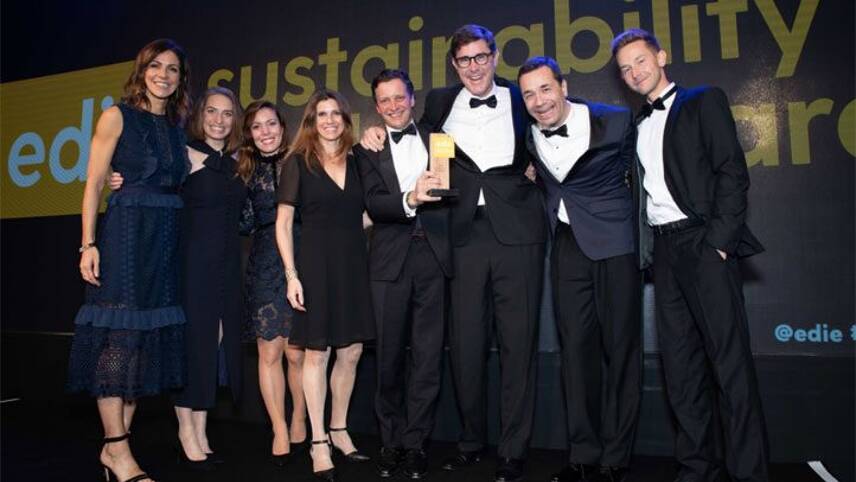Register for free and continue reading
Join our growing army of changemakers and get unlimited access to our premium content

Pictured: edie content director Luke Nicholls (right) and compere Julia Bradbury (left) present Barry Callebaut with the award
Chocolate manufacturer Barry Callebaut has an aim to make sustainable chocolate “the norm” by 2025 through its “Forever Chocolate” programme. It aims to do this through farm mapping, carbon footprint measurement and creating publicly accessible methodologies.
Since Forever Chocolate launched, sustainability progress was achieved through improvements for cocoa farming communities, reforesting with cocoa seedlings and shade trees, reducing the carbon footprint and increasing the uptake of sustainably produced chocolate and cocoa products. As of February 2020, the company sourced 44% of it cocoa sustainably and 52% of its non-cocoa ingredients are also sourced sustainably.
To achieve its Forever Chocolate objective, it has rolled out five specific schemes: the development and gathering of farmer data sets; the establishment of five pilot projects in five key cocoa-growing countries; enabling access to a farm services business to improve the productivity and diversity of cocoa farms; calculation of its carbon footprint to understand its biggest carbon impact and track progress in shifting the supply chain to a carbon positive trajectory through reduction and offsetting; and scaling of its Cocoa Horizons programme as the preferred impact-driven approach to reach sustainability targets.
Specific actions internationally include support for tackling deforestation in Cameroon; being one of the founding members of the Roundtable on Sustainable Coconut and Coconut Oil, and convening in Russia the first roundtable meeting to discuss sustainable sugar beet production. Additionally, the firm has also worked on a carbon footprint methodology for the supply chain, including using satellite data to calculate the carbon impact of land cleared for agriculture with the aim to make this methodology publicly available.
In terms of Scope 1 and 2 emissions, 16 of Barry Callebaut’s 60 factories are powered by renewable energy, and these facilities are developing guidelines for carbon insetting – a form of offsetting which occurs within a company’s value chain – as part of the assessment of its scope 3 emissions. In 2019, Barry Callebaut has also under the Cocoa and Forests Initiative (CFI) committed to delivering 100% traceability in its direct cocoa supply chains in Ghana and Côte d’Ivoire. A heat map has also been developed to provide an overview of areas where the sourcing agricultural raw materials has a high risk of deforestation.
Staff within the company have also been given specific targets and KPIs against the Forever Chocolate scheme: sales teams receive sustainability targets; operations teams receive energy efficiency targets; and there is a group level target that cascades to regions and units, with personal bonuses impacted by performance. Metrics are aligned with the specific targets. Initiatives have been launched, such as its award-winning Seeds for Change employee engagement program, to ensure all employees can impact its Forever Chocolate commitments.
Externally, customers are engaged with Barry Callebaut’s broad sustainability agenda and are encouraged to see environmental and social work as a differentiation. Investors, meanwhile, are updated on sustainability initiatives during investor days; and industry working groups enable Barry Callebaut to work together with customers and competitors on the challenges impacting us all.
As an organisation, Barry Callebaut’s Forever Chocolate KPIs are measured and externally verified annually – for transparent communication on progress. Its emissions reduction targets have been submitted for approval to the Science-Based Targets Initiative (SBTi), including commitments to also account for all Scope 3 emissions. More broadly, each of its four Forever Chocolate targets align with the UN’s Sustainable Development Goals (SDGs).
What edie’s judges said: “Barry Callebaut are showing leadership in a complex supply chain and delivering results to realise the big challenges, using bold ambition to tackle the social and environmental issues across the whole sector. Fundamentally, the company is altering sustainability across the industry.”
Are you our next winner?
Now entering their 14th year for 2021, the RSA-accredited Sustainability Leaders Awards are a unique opportunity to shout about the achievements you and your company have made during this challenging year.
Entries have now closed for the award scheme and our shortlist of finalists has been released. In a digital event on Wednesday 3 February 2021, entrants will get the chance to celebrate virtually with leaders from across the sustainability, CSR and energy space. Some exciting new categories have been added for 2021 to recognise excellence across the spectrum of sustainable business.
— REGISTER TO ATTEND THE 2021 SUSTAINABILITY LEADERS AWARDS HERE —
edie Staff


Please login or Register to leave a comment.